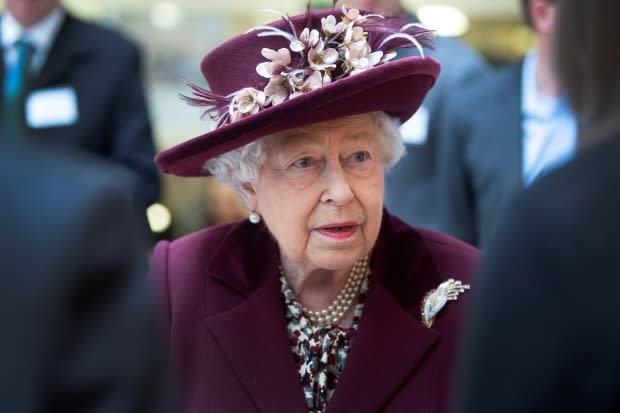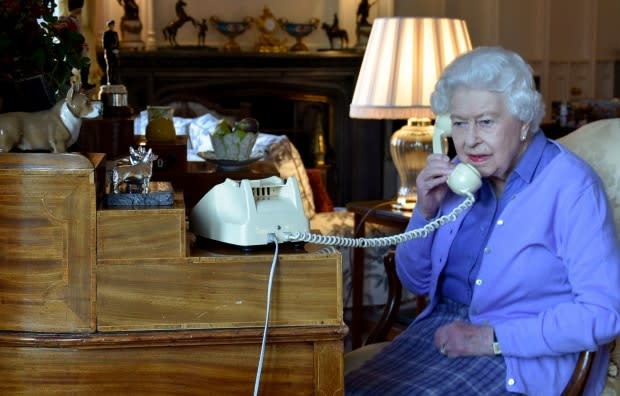Why the Queen's rare broadcast will bring 'dignity and gravitas' to the battle against COVID-19

It doesn't happen very often — in fact, she's only done it four times in the 68 years of her reign.
But it will happen again on Sunday, when Queen Elizabeth makes a special broadcast — this time in response to the coronavirus pandemic that is unleashing such great uncertainty, illness and an escalating number of deaths throughout the United Kingdom, the Commonwealth and around the world.
The televised broadcast, recorded at Windsor Castle, where she and her husband, Prince Philip, are staying, is likely to be calm and stoic, offering thanks to those on the front lines of the fight against COVID-19 and support for everyone working together at a time of crisis.
"It's not going to be Churchillian. It's not in her nature," said John Fraser, author of The Secret of the Crown: Canada's Affair with Royalty, alluding to the British leader famed for his Second World War oratory. "But it will probably be quite moving."
Elizabeth isn't "leading us out on the battlefield," Fraser said, but she's likely to "ask us to hold together."
On one level, Fraser suggested, the address is likely to be "fairly anodyne," with the Queen thanking the people who are working and caring for those who have COVID-19. But Fraser expects she will also do what she does best: "presenting her dignity and gravitas."

While the address is a rarity, it is not really a surprise. Many in the United Kingdom were wondering when the Queen would address the country.
And the timing is likely quite deliberate.
"Queen Elizabeth acts on the advice of her government, and the timing of the broadcast will have been determined in consultation with Prime Minister Boris Johnson and perhaps Commonwealth leaders as well," said Toronto-based royal author and historian Carolyn Harris.
Other such addresses came at the beginning of the 1991 Persian Gulf War; a few days after the death of her daughter-in-law, Diana, Princess of Wales, in 1997; after her mother's death in 2002; and for her Diamond Jubilee in 2012.
The address after Diana's death came following a widespread view that the Royal Family was out of touch with public sentiment.
"At the time of Diana's death, the Queen's first course of action was to remain at Balmoral with her family, allowing her grandsons Prince William and Prince Harry to mourn in private," said Harris.
WATCH | Queen Elizabeth make an address after the death of Diana in 1997:
"However, there was widespread popular demand for the Royal Family to be seen mourning with the people, and the Queen and her family returned to London and the Queen gave an address as a grandmother in response to the widespread outpouring of mourning."
While Sunday's broadcast is a relative rarity, it won't be the first time the Royal Family seeks to show support at a time of crisis. But the particulars of this crisis in some ways may be dictating the format of that support.
Doing things differently
"The social distancing required to reduce the spread of COVID-19 precludes the traditional royal engagements that took place in past times of crisis," said Harris.
During the Second World War, Elizabeth's parents, King George VI and Queen Elizabeth, went to visit neighbourhoods in London's east end devastated by bombs during the Blitz.
And Elizabeth visited the site of the Aberfan mining disaster in Wales, a focus of one of the episodes of the current season of the Netlix drama The Crown.
But this situation is different.
"As the Queen cannot make in-person visits to those who are suffering during the COVID-19 pandemic, the broadcast provides a way for her to speak directly to the people of the United Kingdom and Commonwealth and acknowledge the work of medical personnel and other essential roles during the crisis," said Harris.
While it's rare that the Queen makes a special televised address, she does do a regular broadcast every Christmas Day.
WATCH | In 2019 Christmas message, Queen Elizabeth encourages 'small steps' to create change:
"That address follows a tradition set by her grandfather, King George V, who saw the radio and the Christmas broadcast as a means of bringing what was then the British Empire and Dominions, and now the Commonwealth, together," said Harris.
"The Queen takes her role as head of the Commonwealth seriously, and her Christmas broadcasts allow her to speak directly to the Commonwealth by radio, television and, in the 21st century, the Royal Family's online social media streams."
Sunday's address is also directed toward the Commonwealth, as noted by Buckingham Palace in announcing the broadcast.
The Queen's address follows a video message from her son and heir, Prince Charles, who addressed the U.K. last week, and is out of self-isolation after falling ill with the coronavirus himself.
"None of us can say when this will end, but end it will," Charles said. "Until it does, let us all try and live with hope and, with faith in ourselves and each other, look forward to better times to come."
Harris said Sunday's broadcast will reassure the public that Elizabeth "is safe and well" and offer a window into how the Royal Family is experiencing a crisis affecting people around the world.
Public interest
During global and national crises, Harris said, there is public interest in how the Royal Family is faring, and their popularity increases if they are seen to be sharing in the same conditions as the wider population.
WATCH | Queen Elizabeth speaks during the 1991 Persian Gulf War:
"In the current pandemic, there has been concern for the health of the Prince of Wales, who contracted COVID-19 and experienced mild symptoms, and for the health of the Queen and Duke of Edinburgh because one of the Queen's footmen also tested positive for the illness."
The Queen could also have an effect on those listening to the message.
"If the Queen expresses her personal support for social distancing measures, she may have a positive impact on the public acceptance of these measures, especially if these policies remain in place for an extended period of time."
Fraser expects the Queen's address will end on a religious note, and also points to the timing, coming as it does on Palm Sunday, and in the Christian calendar, during the "toughest week of the year."
He also expects the address will encompass other religions and will "probably bring a lot of comfort."
"There are not many figures in the world who can transcend national boundaries as well as she can," he said.
"I think for her, it will be memorable."
The Queen's special broadcast will be live streamed on CBCNews.ca on Sunday. Special coverage begins at 3 p.m. ET.

